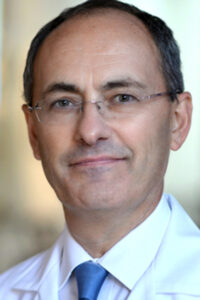
Targeting HER2 in breast cancer is one of the biggest successes in oncology, with a plethora of agents currently available for the treatment of HER2-positive breast cancer; however, the vexing question remains as to which agent is appropriate for which patient at what time, according to Matthew Ellis, MB, BChir, BSc, PhD, FRCP.
“The biggest challenge in attempting to answer that question is that HER2-positive breast cancer is a heterogeneous disease, even though we treat it as one disease entity” said Dr. Ellis, Professor and Director of the Lester and Sue Smith Breast Center and Associate Director for Translational Research at the Dan L. Duncan Comprehensive Cancer Center at the Baylor College of Medicine.
Dr. Ellis will serve as moderator of the Translational Science Forum HER2 Heterogeneity, Thursday, December 9, at 2:00 pm CT, during which a panel of researchers and clinicians will discuss current evidence related to treatment strategies and outcomes for HER2-positive breast cancer.
“For many years, we thought that the only mechanism of HER2 activation in breast cancer was gene amplification,” Dr. Ellis said. “Then, a few years ago, my group and others described point mutations which also activate HER2, in a manner that doesn’t involve gene amplification. That adds some complexity to the question of optimal treatment strategy.”
Compounding the complexity, he said, HER2 amplification occurs in the context of other mutation events, such as deletions of tumor suppressors and/or point mutations in other genes in the HER2 signaling cascade, most notably, mutations in the PI3 kinase alpha catalytic subunit (PIK3CA).
Another issue is the fact that the HER2 amplicon structure is also heterogeneous. For example, sometimes it extends to involve TOP2A and sometimes not. This may also affect efficacy.
“We have to account for HER2 heterogeneity in our treatment paradigms,” Dr. Ellis said. “And, of course, tumor cells don’t live in isolation—they live in a microenvironment that involves stromal cells, extracellular matrix such as mucin, and inflammatory cells. How do these factors affect treatment outcomes, and are these molecular and cellular interactions the basis for an intervention that could enhance treatment efficacy?”
Joining Dr. Ellis for the forum, Kim Blenman, PhD, MS, Assistant Professor of Medical Oncology, Yale School of Medicine and Yale Cancer Center, and Assistant Professor of Computer Science at the Yale School of Engineering and Applied Sciences, will review new and emerging basic science data that are advancing the understanding of the heterogeneity in treatment and outcomes of HER-positive breast cancer.
Aleix Prat, MD, PhD, Associate Professor at the University of Barcelona and Head of the Medical Oncology Department at Hospital Clinic Barcelona in Spain, will describe the tumor biology and the subclassifications of HER2-positive disease and offer some insight as to which agents might be appropriate for which molecular settings.
Sara Tolaney, MD, MPH, Associate Professor of Medicine at Harvard Medical School and Associate Director and Chief of the Division of Breast Oncology at the Dana-Farber Cancer Institute’s Susan F. Smith Center for Women’s Cancers, will discuss clinical management strategies and update attendees on the growing panoply of new agents available, including monoclonal antibodies, antibody-drug conjugates, and small molecule inhibitors.
“There is a lot of complexity to resolve, and this forum is dedicated to discussing the issue of HER2 heterogeneity so that we can match the right treatment to the right patient at the right time,” Dr. Ellis said. “Obviously, one size does not fit all, and we need to continue to think about new diagnostic approaches that might guide us in the right direction.”

